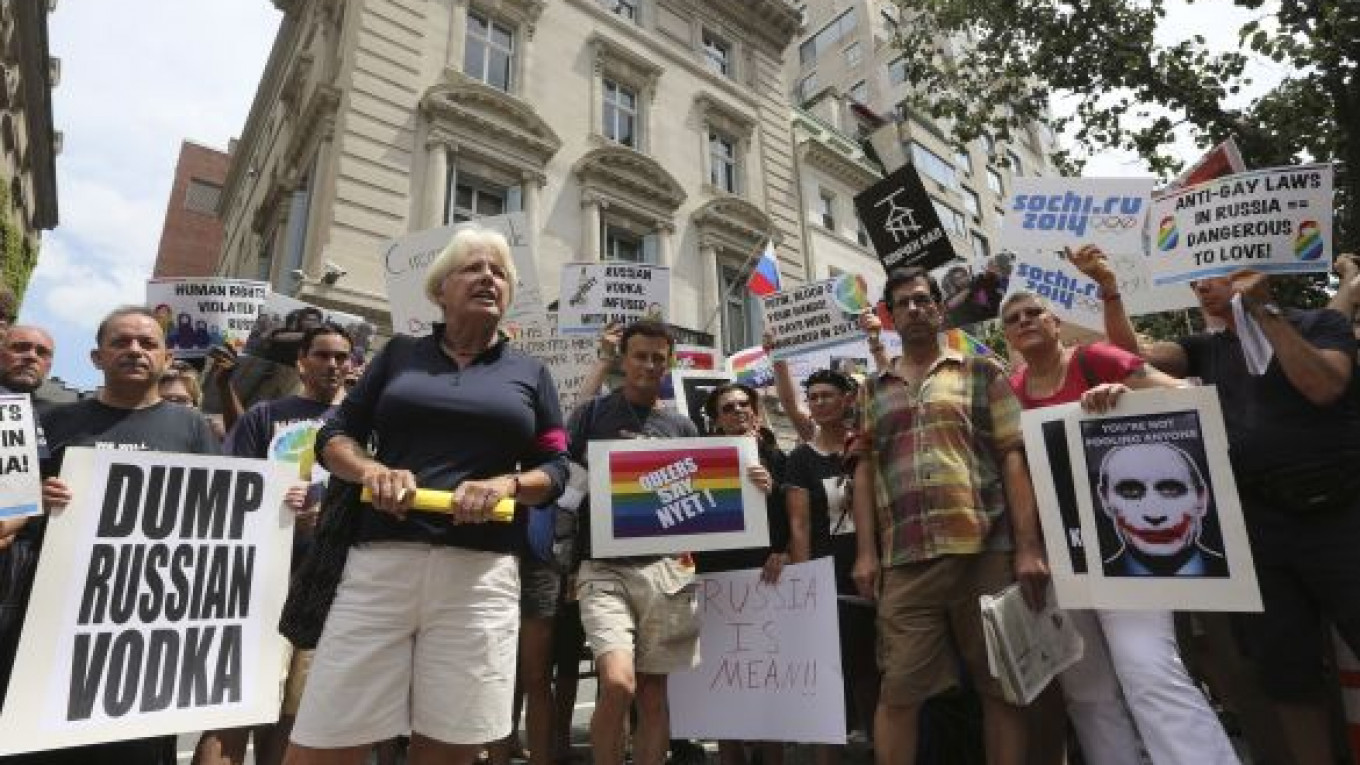Sports Minister Vitaly Mutko said Thursday that Russia's legislation against "gay propaganda" would apply to athletes and visitors of the Olympic Games in Sochi this winter, despite earlier reassurances by the International Olympic Committee that it would not.
The announcement comes as protests against the legislation intensify in the West and calls for an Olympic boycott spread, with the most recent displays of outrage being American bartenders pouring vodka outside the Russian Consulate in New York on Wednesday.
The protests have been stepped up after Western media reported that Russia's law banning "homosexual propaganda among minors" would leave the games' gay visitors, including athletes, audience and journalists, susceptible to arrest.
Western governments and some travel agencies have gone so far as to issue warnings about traveling to Russia, and a number of politicians, gay activists and human rights groups have called for a boycott of the Sochi Olympics, Olympic sponsors and "all things Russian" in general.
After increasing international pressure, the International Olympic Committee said last Friday it had received assurances from the Russian government that the anti-gay legislation would not apply to Olympic athletes and visitors during the games.
But Mutko was quick to refute that, saying that "the law does not ban non-traditional sexual orientations, but does ban propaganda among minors."
"No one bans a gay athlete from coming to the Sochi Olympics, but if a person goes to the street and starts promoting it, then of course he or she will be brought to justice. Laws of a country to which a person comes must be respected, even though the person is an athlete," Mutko told R-Sport on Thursday.
St. Petersburg lawmaker Vitaly Milonov, one of the controversial law's authors, also said the law must be in effect during the Olympics and applied to visitors.
The law, which stipulates fines of between 4,000 rubles and one million rubles ($124 to $31,000) for promoting homosexuality among minors, was signed by President Vladimir Putin in late June, and it has been provoking demonstrations around the world ever since then.
Wednesday's vodka dumping stunt in New York was part of a wider campaign to boycott all Russian brands of vodka. Several bars throughout the U.S. have stopped selling Russian brands to protest the anti-gay law.
Val Mendeleyev, the CEO of SPI Group, which produces Stolichnaya, a vodka that is especially popular in the U.S., said earlier this week in an interview with Forbes that his company condemned the anti-gay legislation, and that by targeting Stolichnaya, protesters were targeting the wrong people.
But vodka is not the only means of protest. Some athletes have mentioned the idea of promoting gay rights at the Olympic games by wearing rainbow-colored flag pins, according to The Associated Press, and there was even talk of a possible gay pride parade at the games.
And instead of boycotting the Olympics, some gay athletes have proposed using the games to raise awareness of homophobia in Russia.
"I want to stand in solidarity with … the rest of the LGBT community to show that Russia's policies are archaic, and a violation of human rights everywhere," said openly gay short track speed skater Blake Skjellerup, who competed in the 2010 Winter Games.
Others, however, say sports should transcend political differences.
U.S. figure skater Johnny Weir, who's married to a Russian native man, Victor Voronov, told USA Today that he didn't want to draw attention to his sexuality at the Olympics.
"My advice would be: Watch what you do when you leave the Village, don't be aggressive, don't wear a big rainbow flag fur coat. If you don't call attention to yourself, attention won't come to you," he said, adding that people should not boycott the games.
The Russian LGBT network Tuesday also urged people not to boycott the Sochi Olympics, saying such a move would likely prevent the rest of the world from joining LGBT people and only isolate them further.
"Do not boycott the Olympics — boycott homophobia! Stand in solidarity with people in Russia and bring LGBT pride and values of human rights and freedoms to the Games in Sochi," the group said in a statement published on Facebook.
A prominent gay rights rally organizer, Nikolai Alexeyev, announced earlier this week via Twitter that Moscow's LGBT movement would hold a parade on the opening day of the Olympics in Sochi.
He said it would "bring to light hypocrites on the International Olympic Committee, Russian public bodies and the European Court of Human Rights, which refused to consider a complaint against the ban of gay pride houses at the Sochi Olympics."
Meanwhile, the Washington-based Human Rights Campaign has called on NBC — the official broadcaster of the Olympic games — to use its broadcasting to show American viewers "this inhumane and unjust law."
The channel's head of sports programs, Mark Lazarus, responded by saying that NBC would raise awareness of any violations if the anti-gay law affected the Olympics.
Contact the author at e.kravtsova@imedia.ru
Related articles:
A Message from The Moscow Times:
Dear readers,
We are facing unprecedented challenges. Russia's Prosecutor General's Office has designated The Moscow Times as an "undesirable" organization, criminalizing our work and putting our staff at risk of prosecution. This follows our earlier unjust labeling as a "foreign agent."
These actions are direct attempts to silence independent journalism in Russia. The authorities claim our work "discredits the decisions of the Russian leadership." We see things differently: we strive to provide accurate, unbiased reporting on Russia.
We, the journalists of The Moscow Times, refuse to be silenced. But to continue our work, we need your help.
Your support, no matter how small, makes a world of difference. If you can, please support us monthly starting from just $2. It's quick to set up, and every contribution makes a significant impact.
By supporting The Moscow Times, you're defending open, independent journalism in the face of repression. Thank you for standing with us.
Remind me later.






